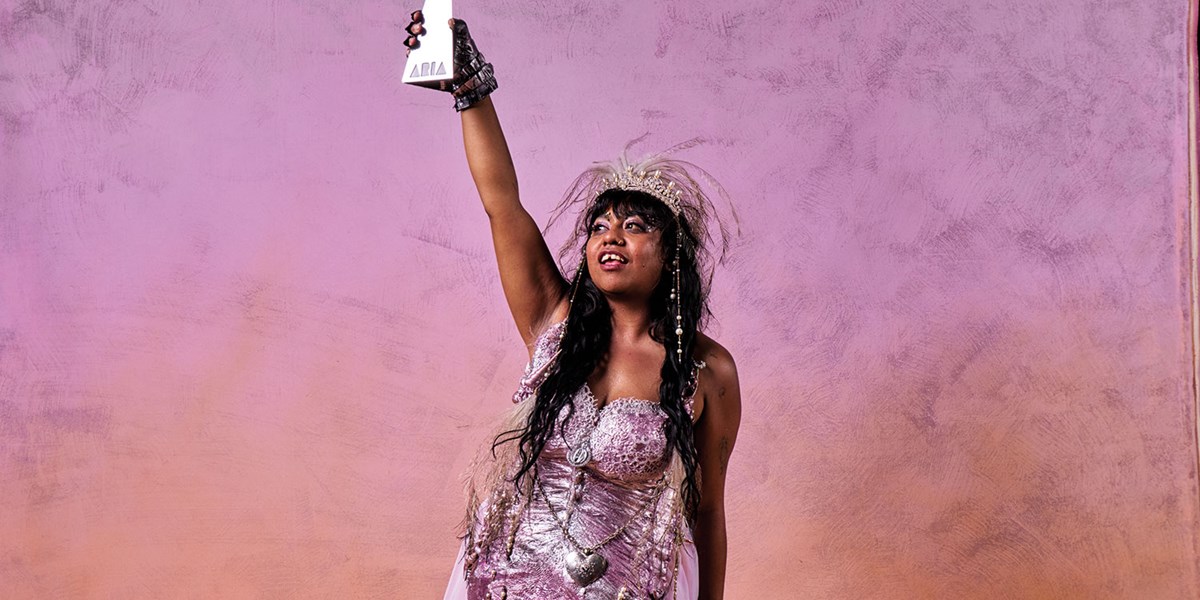Thursday, January 30, 2025
Introducing... Emily Wurramara
On her latest album the rising Anindilyakwa star channels trauma, ancestral knowledge and togetherness. “It’s a community-driven record”, she declares

Emily Wurramara (photo: Jess Gleeson)
Last December, 28-year-old singer-songwriter Emily Wurramara became the first Indigenous Australian to win the Best Adult Contemporary Album gong at the ARIA Awards, Australia’s version of the Brits. The prize – given for her current second release NARA, a word meaning ‘nothing’ in her native Anindilyakwa language – was not before time. First Nations artists have long been a force to be reckoned with in Australia, a country with a famously poor stance towards its original inhabitants.
Indeed, Wurramara’s single ‘Lordy Lordy’ is a hook-laden electro-pop tune that addresses such endemic racism: ‘Lordy, lordy, what do we do now? I burn, it’s black, it’s blinding red’, she sings in her big soul voice, referencing the “No” result in the historic 2023 constitutional referendum – which failed to enshrine an Indigenous presence at Parliament – and colours in the Australian Aboriginal flag. Multi-awarded, critically acclaimed, on the brink of a national tour that includes two high-profile slots at WOMADelaide, Wurramara is becoming a figurehead for her (Indigenous Australian) generation.
“It’s part of our law, ancestrally, to pass on our knowledge and make the space for [those that come] after us”, says the mother-of-one. “To continue telling the stories that our ancestors have told for 65,000 years. These different phrases of our lives are portals of emotional and physical existence.”
Born in Groote Eylandt, an island off the Northern Territory, raised in Brisbane and based in Tasmania, Wurramara has built a career on being raw, honest and outspoken. NARA’s catchy soul-pop tunes in English and Anindilyakwa tell soul-baring stories of family history and lived experiences, her creativity nurtured by an extended family of, variously, women who passed down cultural lore, songmen who sang in [her Indigenous] language and musicians who performed in community bands. While her 2016 EP Black Smoke, which included the grooving ‘Ngayuwa Nalyelyingminama Nungua’ (“The most beautiful way you can say ‘I love you’ in my culture”), and her folky 2018 debut Milyakburra marked her out as an artist to watch, it’s NARA that is elevating her to national treasure status.
The album’s 12 powerful, emotional songs span themes including trauma, tragedy and recovery. The heartfelt ‘Midnight Blues’ draws from 2017, a tumultuous year in which she gave birth, suffered postnatal depression and twice attempted to take her own life. Then there’s the album’s title, which she had tattooed on her arm after her Meanjin/Brisbane home and belongings were taken by a house fire: “I was watching everything burn from across the road and felt a sort of release”, she’s said. “It made me reorganise my priorities and what I thought was important in my life.”
Creating NARA helped her process her trauma, aided by a three-week retreat at a studio in Larrakia country (Darwin) with co-producer Kuya James and with friends and relatives, including her younger brother, vocalist Arringarri (guesting on the fierce, fabulous ‘STFAFM’), popping in and out.
“It’s a community-driven record”, says Wurramara, whose mother and several cousins appear in the music video for ‘Lordy Lordy’, which features Gumbaynggirr man Tasman Keith. “That comes through on the whole record, this feeling of connection.”
+ Emily Wurramara will perform at WOMADelaide, March 7–10

